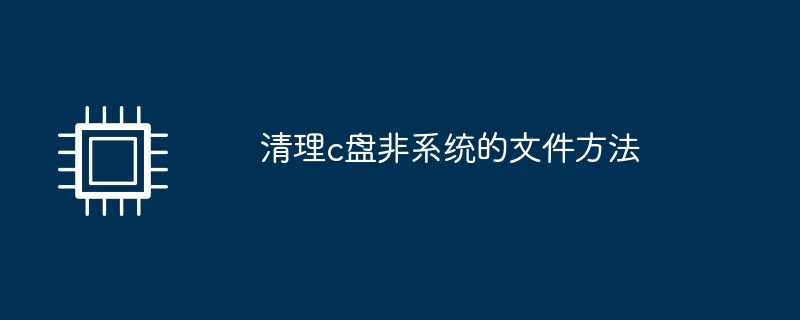Home >Hardware Tutorial >Hardware News >How to clean up non-system files on C drive
How to clean up non-system files on C drive
- PHPzOriginal
- 2024-09-02 13:03:03471browse

In the daily use of computers, the C drive often causes insufficient hard disk space due to the storage of a large number of non-system files. Once a problem arises, it needs to be faced squarely. We will handle it promptly and it will never cause other impacts or problems. Then let’s take a look at how to solve the problem!
1. Manually delete files. While opening the C drive, filter the folders in it and delete unnecessary files and folders, such as temporary files, downloaded files, Recycle Bin, etc. In addition, you can also use the system's built-in disk cleanup tool to clean up. Just enter "disk cleanup" in the search box and select the disk you want to clean. The system will automatically scan the files that can be cleaned and display them. Just Check the items that need to be cleaned to complete the cleaning operation.
2. Use some third-party cleaning tools. Minimalist C Drive Cleanup Master (click to download) This tool is usually more powerful than the system's own functions, and can identify and clean more types of non-system files, such as cache files, temporary files, invalid registry, etc. It can also perform in-depth cleaning and optimization of files, which can more effectively free up hard disk space and improve system performance.
3. Regularly clean up non-system files on the C drive, which can effectively avoid the problem of insufficient hard disk space and maintain the good operating status of the system. At the same time, cleaning up non-system files on the C drive can also help protect personal privacy and improve system security.
Cleaning non-system files on the C drive is an important step in maintaining computer performance. Through the methods introduced above, we can easily clean up the C drive and keep the computer in good running condition. If you don't know how to speak, the editor recommends that it is really worth learning.
The above is the detailed content of How to clean up non-system files on C drive. For more information, please follow other related articles on the PHP Chinese website!
Related articles
See more- Similarities and Differences between Baselis Snake x Speed Edition and Ultimate Edition
- Why can't I buy mine cards? Details
- Comparing Razer Sano Tarantula and Dalyou DK100, which one is better?
- The 8th generation flagship mobile phone in 2019, you definitely can't miss it!
- Will the smartphone market usher in a cloud service revolution?

